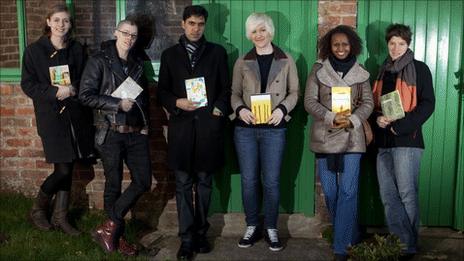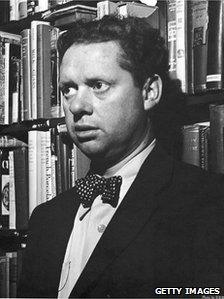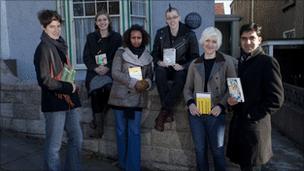Dylan Thomas shortlisted writers reach out to young
- Published

The six young writers shortlisted for the 2010 Dylan Thomas Award
Five young women and one man, all with a chance of winning a £30,000 literary prize, are spending a week, Big Brother-style, holed up in a south Wales farmhouse.
But this is not for a new TV reality show set in a 2010 farm.
The six writers, some from as far afield as New Zealand, the US and India, are all in with a shout of winning the third Dylan Thomas prize.
In the run-up to the award ceremony on Wednesday they have been sharing some of their creative know-how with school children and university students across south Wales.
They have been enjoying getting to know each other better without the intrusion of TV and internet.
Poet and playwright Caroline Bird, 24, is a second time nominee for a prize launched four years ago, and for her the week of togetherness is an "amazing thing".

Dylan Thomas is the inspiration for the award
She said: "We are really getting to know each other, to know why we are all doing this."
Indian-born novelist Karan Mahajan, the only man shortlisted for the prize which this year switches from a biennial to an annual award, the experience has been "fantastic".
"I feel like the lone kid brother, a bit indulged," admits the 26-year-old, originally from New Delhi.
'Really wonderful'
US poet Elyse Fenton has bought an additional member to the creative writing gathering - her 10-month old baby girl Mira.
"It's been different, really wonderful," said the poet, whose work Clamor was born out of her medic husband being deployed to Iraq and the fragments of instant messaging conversations they shared over the internet.
The prize was set up with the double aim of honouring the poet and to encourage writing among the young.
Judge Prof Kurt Heinzelman, from the University of Texas, said this year - for the first time - the prize has been achieving its pedagogical aim.
"This year we have a very, very strong group of finalists who have been to schools talking to people from 14-year-olds up to university graduates.
"This year for the first time we have been able to really focus on the pedagogical purpose of encouraging creative writing."
"I think Wales is going to be a huge beneficiary of this."
The writers agree that going out talking to other young writers about their art is almost bigger than the prize which, if they pick it up, will help further their own careers.
Emilie Mackie has visited the University of Wales Newport to join creative writing sessions.

The six outside the house in Cwmdonkiin Drive, Swansea, where Dylan Thomas was born
"They were really a great bunch of students, and it was a cool campus," said Mackie. "I really prefer talking to other writers about their writing, rather than talking about my own.
For Nadifa Mohamed, the experience has been more than a coming home. Part of her novel Black Samba Boy about her father's growing up in Somalia draws from Under Milk Wood, the play for voices by the Welsh writer whose prize she is now nominated for.
She said: "I studied him for A levels, he was the only one who really shook me up."
Mohamed, who started writing her novel in a cottage overlooking Cardigan Bay, said it was great to go out and meet the children in a local school and connect with them, to show them the connection between her work and their local area.
New Zealander Eleanor Catton wrote her controversial work The Rehearsal dealing with a sexual affair between a teacher and pupil while doing a masters in creative writing.
She said: "I think they really are amazing, formative places - to form conversations and meet people who care about what you care about and really want to listen."
She said the focus of the week was not just about the prize itself.
"It's more about the community."
- Published21 September 2010